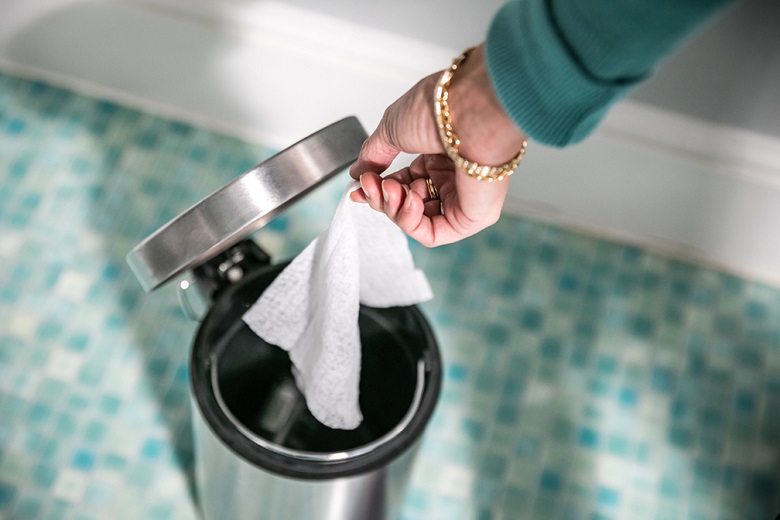Over 24 million people admit they have flushed tampons, wet wipes or sanitary products down the toilet
Thursday 24th February 2022 09:59

- Over twenty-four million people across the UK have admitted to flushing wet wipes, tampons or sanitary pads without thinking of the consequences.
- Many toiletries contain plastic, which can cause blockages in pipes that lead to pollution and flooding.
- Survey shows that more than one in four (27%) people wouldn’t flush these items if they knew it would cause damage to the environment.
Flushing wet wipes and sanitary products down the toilet has become a common practice across the UK, a new study has shown by Thames Water, leading to blockages in pipes in peoples’ homes and communities.
A survey1 of 2,000 people revealed that two in five (45%)2 have put at least one of these products in the toilet instead of the bin.
The survey showed almost 3 in 10 (29%) flush wet wipes, with almost a quarter (24%) flushing tampons and just under 1 in 8 (12%) people flushing nappies, with more than half (55%) rarely thinking about what happens to them afterwards.
But many of these products contain plastic and do not break down in the water, leading to blockages that can cause sewage pollution and flooding.
It’s estimated around 2.5 million tampons, 1.4 million sanitary pads and 700,000 panty liners are flushed every single day in the UK3.
In November 2021, the harm caused by these products was in the spotlight after Fleur Anderson MP launched a private members’ bill to ban plastics from wet wipes.
However, despite one in four people (27%) saying they wouldn’t flush these items if they knew it would cause damage to the environment, one in five (22%) admit they have flushed more wet wipes since the start of the pandemic.
Anna Boyles, Thames Water operations manager, said: “We know many busy people love the convenience of these products, but most are made from plastic and take hundreds of years to break down. In fact, there’s as much plastic in a pack of 14 sanitary pads as there is in five carrier bags.
“Not only can these products block your toilets, but they also clump together with cooking fat in the sewers to form fatbergs. These blockages can force sewage to back up into your home, through manhole covers in gardens, streets and open spaces, and into rivers and seas.
“The only way you can be sure you are not contributing to plastic and sewage pollution is to bin products like nappies, sanitary pads, tampons and wet wipes.”
Fleur Anderson MP for Putney said: “It is shocking that so many people are still flushing non-dispersible wet wipes and other plastic containing items. We need clearer labelling on all plastic containing items.
“My Bill to ban plastic in wet wipes aims to take the choice out of the hands of the consumer and make sure that manufacturers take responsibility for combating the plastic pollution that is causing untold damage to our water systems and marine environments.
“Until then, I would encourage everyone to only flush wet wipes with a 'fine to flush' logo.”
Each year, Thames Water spends £18 million clearing 75,000 blockages from its sewers, but is tackling the problem by helping customers make positive changes to their bathroom and kitchen habits.
The company is also pioneering the next generation of ‘sewer level monitors’ which help detect emerging problems before they grow into something more serious, and is working with more than 3,000 restaurants, pubs and other food service establishments to help them install effective grease management systems.
Find out more about Thames Water’s Bin it-don’t block it campaign.
1. The survey of 2,032 people across the UK was carried out by Censuswide on behalf of Thames Water in November 2021.
2. Population estimates for the UK, England and Wales, Scotland and Northern Ireland: mid-2020 (Office for National Statistics).
- 920 out of 2023 people (45%) said yes to the question “Have you ever flushed the following down the toilet – wet wipes/make-up wipes/nappies/sanitary pads/sanitary tampons?”.
- 510 out of those 920 people (55%) agreed that they rarely think about what happens to wet wipes/make-up wipes/nappies/sanitary pads/sanitary tampons after flushing them down the toilet.
- ONS 2020 UK population: 67,081,234
- UK population aged over-16 in 2020: 54,353,665 x 0.45 = 24.5 million
3. More facts about plastic pollution from sanitary products can be found on the City to Sea website.
